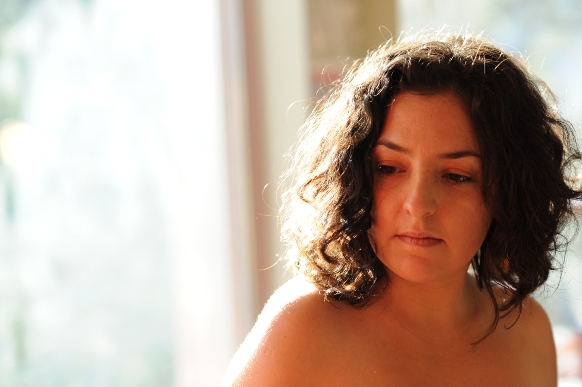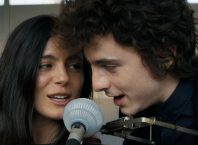
“I’m homeless with roots, a backpack and roots,” said vocalist/composer Ayelet Rose Gottlieb, whose single Shirat Isha, from her forthcoming album Roadsides (Betzidei Hadrachim), will be released March 8, 2013, in celebration of International Women’s Day. Shirat Isha – a woman’s song. Ayelet’s voice is a woman’s voice, a Jerusalem voice, a voice and song that were born in Jerusalem and have performed around the globe, carrying a feeling of home in her backpack, within the music. Shirat Isha, and other songs from the album will be performed by Ayelet Rose Gottlieb and her ensemble – Anat Fort (Piano), Udi Horev (Guitar), Ora Boazson-Horev (Upright Bass), Dani Benedict (Drums), Gilad Dobrecky (Percussion) – at the Ozen Bar on March 17, 2013.
Roadsides, Ayelet’s jazz compositions to Israeli and Palestinian poetry, is also a journey through time. Currently in Israel, preparing for the upcoming concert and working on the album, the musician met with me in Tel Aviv to discuss her music and artistic process. Trained as a classical musician, her first instrument was the flute, but although her formal graduation recital was on the flute, Ayelet said, “at the same time I was exploring improvisation – sound, jazz, Arabic, African, other than Western classical musical traditions.” Ayelet Rose Gottlieb composed the music to Ester Raab’s poem while still a high school student in Jerusalem, and the song has travelled with her ever since, yet was never recorded.
“I give thanks for I am a woman” – Esther Raab
Ayelet Rose Gottlieb:
“Esther Raab is considered the first Hebrew woman poet [the first born in Israel]. I love this text. I remember when I was in junior high, I went to a school of the conservative movement. Every Monday we had prayers, only on Mondays, women and men together, and I remember the feeling of humiliation in having to say sheh-asani Kirtzono (who has made me according to his will). I don’t see anything terrible in ‘according to his will’, I think there is something beautiful in saying it, if it relates to everyone. There is something Zen about it. But when we say asani kirtzono and they [men] say shelo asani isha (who did not make me a woman) it’s insulting, and as a thirteen year old I was really offended by it. This and other things made me feel very anti-Judaism in general and it took me a while… when I lived in the States I encountered a different Judaism and I began to see the beauty and to see things differently.”
“I come from a super-Jerusalem family. My parents live in Nahlaot, my grandparents were born here, my grandmother would recite Shirat Dvora (The Song of Deborah). It’s in my blood, but I had to find some distance before I could come closer [to Jewish texts]. Distance from the religious/political context in which they are enmeshed in Israel.”
“One of my previous albums is called Mayim Rabim and it’s based on the Song of Songs, recorded on the John Zorn’s Tzadik label. It was very important for me to take a sacred text and take the sanctity out of it, and relate to it from a perspective of language, passion, desire, urges, relationships, to see perhaps it in a feminist perspective, to look at these texts from my world view, and look at the Biblical texts with an enormous love for the Hebrew language.”
“That is why I think Esther Raab’s poem has stayed with me for so many years because there is something in it that engages with the Biblical text and Hebrew prayer but in a sincere way which is very important to me, as a Jerusalemite, not to throw things out, but to engage in dialogue with Judaism and its expression, especially in Israel. That connection and communication is very important to me, and she does it in this poem, it has a lot of power and empowerment, but without rejection. So the poem continues to reverberate for me.”
“Praised are you for making me/circles – circles” Esther Raab
“It’s such a fun line. It’s an anthem for so many women. Not all women are round, but many are, very many…so many of us have to deal with our circles and it’s not always easy, we don’t always love these circles and we’d prefer some straight lines. It’s a lot of fun to sing. One of the first times I performed this song, a friend who did not feel comfortable with her body came up to me afterwards and said it was the first time she felt happy with her body.”
Enjoy Shirt Isha:
Ayelet Rose Gottlieb and her ensemble will be performing at The Ozen Bar, 48 King George Street, Tel Aviv on March 17, 2013 at 20:00. Call 03-6215210.
A Woman’s Song by Esther Raab, translated by Ayelet Rose Gottlieb
I give thanks for I am a woman
for I am earth and flesh*,
and a soft rib
Praised are you for making me
circles – circles
as the zodiac wheels
as the roundness of fruits,
for giving me a living body
that blooms
and making me as the plant of the fields
able to bear fruit.
Threads of your clouds
slide like silk
on my face, on my thighs
and I am big
but I yearn to be a child,
crying in agony
and laughing, and singing with a voice
so thin
as a cricket in your choir of cherubs
glorious
the smallest of the small
I play
at your feet
my creator!





